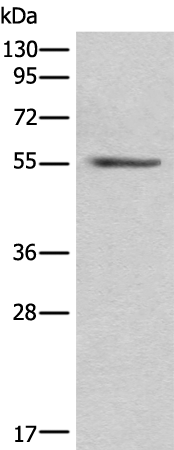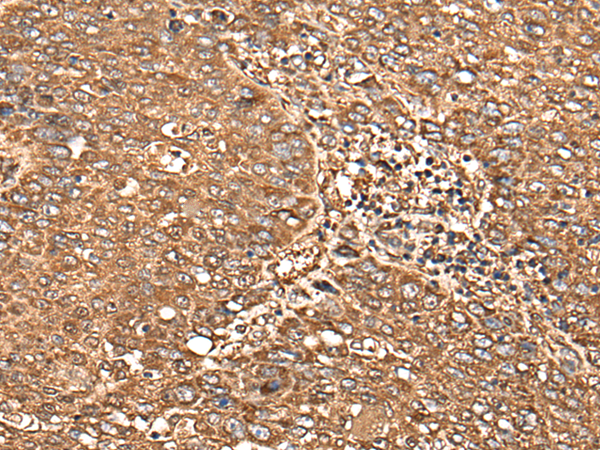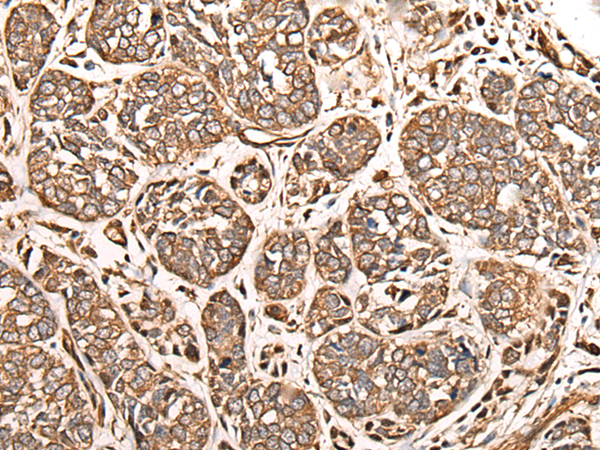


| WB | 咨询技术 | Human,Mouse,Rat |
| IF | 咨询技术 | Human,Mouse,Rat |
| IHC | 1/25-1/100 | Human,Mouse,Rat |
| ICC | 技术咨询 | Human,Mouse,Rat |
| FCM | 咨询技术 | Human,Mouse,Rat |
| Elisa | 1/5000-1/10000 | Human,Mouse,Rat |
| Aliases | ALXDRD |
| WB Predicted band size | 50 kDa |
| Host/Isotype | Rabbit IgG |
| Antibody Type | Primary antibody |
| Storage | Store at 4°C short term. Aliquot and store at -20°C long term. Avoid freeze/thaw cycles. |
| Species Reactivity | Human, Mouse, Rat |
| Immunogen | Synthetic peptide of human GFAP |
| Formulation | Purified antibody in PBS with 0.05% sodium azide and 50% glycerol. |
+ +
以下是关于GFAP抗体的3篇参考文献及其简要摘要:
---
1. **文献名称**:*Glial fibrillary acidic protein (GFAP): The major protein of glial intermediate filaments in differentiated astrocytes*
**作者**:Eng LF, et al.
**摘要**:该综述总结了GFAP的结构、功能及其在星形胶质细胞中的核心作用,强调其作为中枢神经系统损伤和疾病的特异性生物标志物的价值,并讨论了GFAP抗体在病理检测中的关键应用。
---
2. **文献名称**:*Comparative analysis of GFAP antibodies for astrocyte labeling in experimental neuropathology*
**作者**:Hol EM, et al.
**摘要**:研究比较了多种商业GFAP抗体的特异性、灵敏度和适用性,发现在不同实验模型(如脑损伤、神经退行性疾病)中,抗体选择显著影响星形胶质细胞激活状态的检测结果,为优化免疫组化/荧光实验提供指导。
---
3. **文献名称**:*GFAP antibodies in the diagnosis of neurological disorders: Focus on neurodegenerative diseases*
**作者**:Stieler JT, et al.
**摘要**:探讨GFAP抗体在神经退行性疾病(如阿尔茨海默病、多系统萎缩)诊断中的应用,发现GFAP表达水平与胶质增生程度相关,支持其作为脑脊液或血液中疾病进展的生物标志物。
---
如需更具体的文献或扩展领域(如最新研究),可进一步补充。
Glial fibrillary acidic protein (GFAP) is a type III intermediate filament protein predominantly expressed in astrocytes, a major class of glial cells in the central nervous system (CNS). It plays a structural role in maintaining astrocyte integrity and is involved in cell communication, motility, and response to injury. GFAP is upregulated during astrocyte activation (astrogliosis), a hallmark of CNS inflammation, trauma, or neurodegenerative diseases like Alzheimer’s and multiple sclerosis.
GFAP antibodies are essential tools in neuroscience research and diagnostics. They enable the identification and visualization of astrocytes in tissue samples via techniques like immunohistochemistry, immunofluorescence, and Western blot. These antibodies help study astrocyte dynamics in neurological disorders, brain tumors (e.g., gliomas), and injury models. Commercial GFAP antibodies are typically raised against purified GFAP protein or specific epitopes, with cross-reactivity validated across species (human, mouse, rat).
In clinical contexts, GFAP autoantibodies in serum or cerebrospinal fluid are biomarkers for autoimmune conditions like autoimmune glial fibrillary acidic protein astrocytopathy (GFAP-A), a treatable inflammatory disorder. Research-grade antibodies also aid in differentiating CNS tumors by detecting GFAP expression in astrocytomas versus non-glial tumors. Variability in antibody performance (due to epitope specificity or sample processing) necessitates careful validation for reproducible results. Overall, GFAP antibodies bridge basic research and translational applications in neurology and pathology.
×